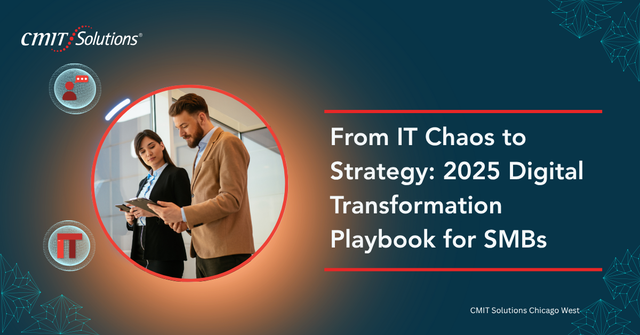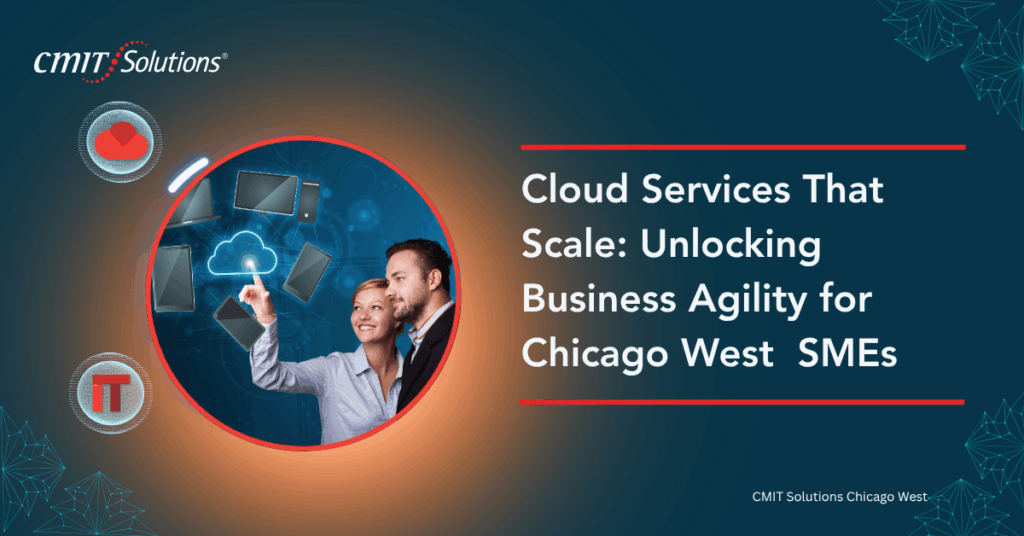Digital transformation is no longer a luxury for small and medium-sized businesses (SMBs) in 2025; it’s a necessity. From tightening cybersecurity defenses to modernizing infrastructure and fostering remote collaboration, SMBs that want to remain competitive must shift from reactive tech chaos to proactive, strategic IT management. This playbook is designed to guide organizations on their journey from disarray to digital dominance, arming them with the right insights, tools, and partnerships.
The State of SMB IT in 2025
Many SMBs struggle with outdated hardware, unsupported software, fragmented cloud usage, and minimal cybersecurity. In an era where data breaches can ruin reputations and compliance is mandatory, ignoring these vulnerabilities is dangerous. For businesses in bustling commercial hubs like Chicago West, ensuring technology evolves with the company’s growth is critical.
Key challenges include a lack of proactive IT support, fragmented remote work setups, and weak data backup and disaster recovery strategies. These gaps impact productivity, data protection, and cost efficiency. Addressing them starts with a comprehensive IT audit to assess network security, software compliance, and backup readiness. With managed IT services in Chicago West, businesses can spot blind spots and avoid missteps.
A strategic roadmap follows—built to align with goals and support compliance frameworks such as HIPAA and GDPR. By incorporating IT guidance from local experts, SMBs can implement flexible, growth-ready infrastructure. It’s not just about solving current issues, but ensuring IT grows with the business and anticipates future needs. The ability to scale efficiently and integrate evolving tech capabilities gives SMBs the agility to stay ahead in an increasingly digital marketplace.
Cybersecurity, Continuity, and Cloud Strategy
Cybersecurity threats are rising, and SMBs are no longer flying under the radar. Implementing a layered defense with Zero Trust policies, active monitoring, and response planning is essential. A local cybersecurity team helps tailor defenses based on your risk profile, ensuring safeguards are not just reactive but preventative.
Simultaneously, cloud-based business continuity planning is vital. Disaster recovery measures, offsite backups, and accessible remote solutions ensure resilience. Downtime can cost SMBs thousands in lost productivity, sales, and reputation. With 24/7 support in place, your business is better equipped for the unexpected—whether it’s a cyberattack or a natural disaster.
Cloud platforms such as Microsoft 365 offer scalable storage, secure file sharing, and streamlined collaboration. They also provide a centralized hub for team communications, project management, and document workflows. Explore our homepage for remote-friendly solutions designed for modern teams that need security without compromising flexibility.
Productivity and Compliance
Efficiency tools like Microsoft Teams, Slack, and QuickBooks Online can transform workflows for small and medium-sized businesses. These platforms enable seamless communication, project tracking, and accounting from any device or location, enhancing workforce collaboration and flexibility. Choosing the right mix of tools ensures smooth integration, helping teams avoid redundancy and improve adoption across departments.
In addition to productivity, these systems support regulatory compliance across various industries, particularly healthcare, legal, and finance. Features like encrypted communication, detailed audit trails, and role-based access controls help SMBs meet the strictest data security standards. By embedding compliance into daily operations through trusted tools, businesses can avoid costly violations while streamlining oversight.
Performance, Communication, and Procurement
To maintain uptime and performance, proactive monitoring is key. Instead of reacting to IT issues, SMBs can detect them early, extending hardware lifespan and boosting reliability. Routine updates, health checks, and performance tuning help ensure the environment runs optimally and securely.
Robust data backup strategies featuring cloud redundancy and encryption ensure digital resilience. Unified communications platforms combine VoIP, video, and messaging to support remote and mobile workers. See client results to learn how others have improved team agility. Reliable communication infrastructure is also vital for customer experience, allowing your business to respond promptly and efficiently.
Procurement also matters. Right-sizing IT spend, negotiating vendor contracts, and aligning purchases with growth plans leads to cost-optimized IT. Procurement should be a data-informed process, evaluating performance trends and lifecycle projections. An experienced IT partner ensures you’re buying smart, not just buying more.
Automation and AI for SMB Efficiency
In 2025, automation and artificial intelligence are no longer just buzzwords—they are competitive necessities. AI-driven tools can streamline data analysis, automate repetitive tasks, and offer predictive insights for business planning. For example, AI chatbots can enhance customer service while freeing up staff for higher-value work.
Automation tools for accounting, scheduling, and customer follow-up can help SMBs save time and reduce manual errors. By integrating these capabilities into your digital roadmap, businesses gain speed and agility. A partner that understands emerging technologies can help guide implementation and ongoing optimization.
IT Governance and Risk Management
As businesses grow more reliant on technology, the importance of IT governance and structured risk management increases. Establishing formal policies for device usage, data access, and compliance procedures ensures that technology serves the business without introducing unnecessary vulnerabilities.
A documented governance strategy supported by local experts helps standardize operations, maintain regulatory compliance, and prepare for audits. With rising scrutiny in industries like healthcare and finance, this proactive approach strengthens business resilience and supports long-term sustainability.
Growth, ROI, and Long-Term Partnerships
Technology should scale with your business. Evaluating IT support responsiveness and ensuring strategic alignment keeps your technology future-ready. Tracking metrics like reduced downtime, cost savings, user satisfaction, and enhanced protection enables leadership teams to make informed, confident decisions about future tech investments.
Our solution framework helps translate business goals into technology priorities with measurable progress. Dashboards, reporting tools, and quarterly reviews all contribute to accountability and visibility, essential for ongoing digital maturity.
Long-term success requires trusted partnerships. With consistent innovation and local expertise, businesses in Chicago West can evolve with confidence. A strong IT partner does more than troubleshoot—they co-create value. From regulatory compliance updates to system migrations and strategic planning, continuous collaboration ensures your digital foundation is always aligned with what your business needs most.
Conclusion: Turning Chaos into Control
From cybersecurity to IT procurement, every part of your digital strategy should support growth, innovation, and resilience. Technology is no longer just a support function—it is a business enabler. The right IT strategy transforms operations, strengthens security, improves user satisfaction, and drives ROI.
Make 2025 the year your business reclaims control. Get started with a consultation today and move from reactive firefighting to confident, strategic execution.






